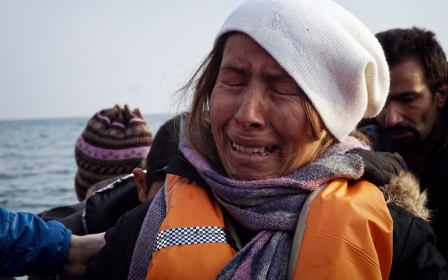Greece braces for violence on eve of refugees' forced return

Greek authorities gearing up to send hundreds of potential asylum-seekers back to Turkey under a controversial EU deal say they anticipate violence when forced returns begin in 24 hours.
Some 750 refugees and migrants are set to be sent back between Monday and Wednesday, Greek state news agency ANA said, the first wave of deportations under the much-criticised agreement struck last month.
All irregular migrants now face being sent back from the Greek islands to Turkey, as Europe grapples with its worst migration crisis since World War II.
Greece has been struggling to get the infrastructure in place under its side of the deal, which has been met with scepticism by EU members like Austria, while the United Nations argues it is illegal.
A spokesman for Greece's refugee coordination unit told The Observer on Sunday that the government is expecting violence.
"People in despair tend to be violent," Giorgos Kyritsis was quoted as saying. "The whole philosophy of the deal is to deter human trafficking from the Turkish coast, but it is going to be difficult, and we are trying to use a soft approach. These people have fled war. They are not criminals."
Kyritsis acknowledged that Frontex, the EU border agency, has not yet dispatched enough people to oversee the operation set to start on Monday. Of 2,300 officials the EU pledged to send to Greece, only 200 have arrived so far, he said.
"We are still waiting for the legal experts and translators they said they would send," Kyritsis was quoted as saying.
On the other side of the Aegean Sea, work is under way on a centre to host those sent back in the Turkish tourist resort of Cesme, town mayor Muhittin Dalgic said.
Another is being created in Dikili, opposite Lesbos, one of several Greek islands that has seen a large influx of people fleeing conflict and poverty in the Middle East and elsewhere.
Turkish media reports say the Turkish Red Crescent is also preparing to open a refugee camp with capacity for 5,000 people further inland in Manisa.
'Hell to hell'
The deal is the latest attempt to stem the number of people in search of a new life in Europe. More than a million refugees and migrants entered last year, and over 150,000 people have crossed the Aegean Sea to Greece in 2016.
For every Syrian refugee sent back under the deal, another Syrian refugee will be resettled from Turkey to the EU, with the numbers capped at 72,000.
"If they make me go back to Turkey I'll throw myself and my family into the sea," said Mustafa, a Syrian waiting with his wife and children at the port of Chios island. "We went from hell to hell."
Austria's President Heinz Fischer said on Saturday that he was "sceptical" the deal would stop more refugees and migrants from coming to Europe, voicing his concern about human rights abuses in Turkey.
"There are many things happening in Turkey right now that I don't like," he told Austrian public radio O1.
The deal has also faced strong opposition from rights groups, and senior UN migration official Peter Sutherland said on Saturday that the deal was "absolutely" illegal.
"Collective deportations without having regard to the individual rights of those who claim to be refugees are illegal," he told BBC radio. "Their rights have to be absolutely protected where they are deported to - in other words Turkey."
Amnesty International said last week that Turkey was not a "safe country" for refugees, reporting that Ankara was forcing around 100 Syrians to return to their war-torn country every day.
Turkey rejected the criticism, with the foreign ministry saying on Saturday "the allegations do not reflect reality in any way".
Refugees sent to Germany
As part of the same EU-Ankara deal, Turkey - which is hosting some 2.7 million refugees from neighbouring Syria - will on Monday begin sending a first group of refugees directly to Germany.
Germany's interior ministry said most of the arrivals expected on Monday would be families with children, putting the number in the "double-digit range".
Hundreds of refugees and migrants continue to land in Greece every day despite the EU deal, and a Greek government source told AFP this week that some 400 Frontex police officers were expected to arrive over the weekend.
Fifty French riot police were arriving on Lesbos on Saturday to help with the operation, with asylum experts to follow later this week.
Clashes have also broken out at Greek facilities, and on Friday hundreds of refugees and migrants walked out of a registration centre on Chios following fresh violence, prompting a leading medical charity to pull out its staff.
Many of them headed to the port hoping to reach ships bound for the Greek mainland, but authorities rerouted the island ferry to another local harbour to prevent unauthorised boardings.
Over 52,000 refugees and migrants seeking to reach northern Europe are already stuck in Greece after Balkan states sealed their borders to stop the influx.
Middle East Eye propose une couverture et une analyse indépendantes et incomparables du Moyen-Orient, de l’Afrique du Nord et d’autres régions du monde. Pour en savoir plus sur la reprise de ce contenu et les frais qui s’appliquent, veuillez remplir ce formulaire [en anglais]. Pour en savoir plus sur MEE, cliquez ici [en anglais].




